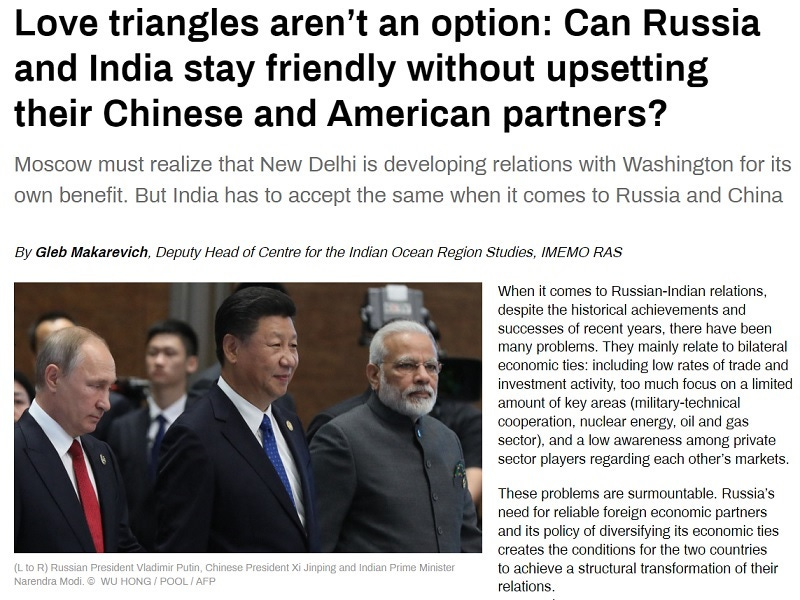Even though India refused to join “NATO Plus” and External Affairs Minister Dr. Subrahmanyam Jaishankar recently reaffirmed the importance of retaining strategic ties with Russia, the Mainstream Media and Alt-Media Community alike falsely claim that India dumped Russia. Neither can acknowledge for their own ideological reasons that the US finally realized the futility of trying to force India into vassalhood and that India remains close to Russia despite tensions with China.
RT raised worldwide awareness of a Russian scholar’s recent work about bilateral ties with India after republishing his analysis from late April on Monday. Gleb Makarevich is Deputy Head of Centre for the Indian Ocean Region Studies at the Institute of World Economy and International Relations under the Russian Academy of Sciences. His prestigious position is a testament to his expertise on this subject, which was first shared at the Valdai Club, one of Russia’s top think tanks that annually hosts its leader.
His article was originally titled “Same Same, but Different: The Peculiarities of Strategic Relations in the Russia-India-China-USA Quadrangle” but republished by RT under the title “Love triangles aren’t an option: Can Russia and India stay friendly without upsetting their Chinese and American partners?” Despite the latter slightly editing it like they wrote at the end, it still retains its essence. In brief, Makarevich argued that Russia and India shouldn’t be influenced by each other’s ties with third parties.
Some in Russia might feel uncomfortable with India’s increasingly strategic relations with their country’s US rival just like some in India might feel uncomfortable with Russia experiencing the same with their own country’s Chinese rival. Nevertheless, they need to acknowledge that each is pursuing their objective national interests as their leaderships understand them to be without any intent to harm the related interests of their decades-long strategic partner.
It can’t be known for sure, but RT might have chosen to republish Makarevich’s advice at this time so as to reassure everyone that Russia doesn’t regard India’s recent expansion of military-technical relations with the US after Prime Minister Modi’s latest visit there late last month as a problem to their ties. Russian Deputy Foreign Minister Sergey Ryabkov earlier told TASS that India “remains one of our largest partners in this domain” despite that deal but not many people might have been aware of this.
Even though India refused to join “NATO Plus” and External Affairs Minister (EAM) Dr. Subrahmanyam Jaishankar recently reaffirmed the importance of retaining strategic ties with Russia, the Mainstream Media (MSM) and Alt-Media Community (AMC) alike falsely claim that India dumped Russia. Neither can acknowledge for their own ideological reasons that “The US Finally Realized The Futility Of Trying To Force India Into Vassalhood” and that India remains close to Russia despite tensions with China.
Their respective zero-sum dogmas are discredited by India’s multi-alignment policy, which EAM Jaishankar said over the weekend is driven by the desire to avoid any form of “exclusive relationships”. The MSM preconditioned their audience to think that dumping Russia is a prerequisite for partnership with the US nowadays while the AMC preconditioned their own to think that having good ties with China is a prerequisite for the same with Russia, but both have been proven wrong by recent events.
India’s balancing act between the US and Russia has been maintained despite defying the MSM’s and AMC’s zero-sum dogmatic expectations of what each dimension was supposed to require according to their respective worldviews. This outcome exposed each camp’s claims about International Relations to be oversimplistic and inaccurate, thus prompting the need for a more detailed and accurate model to explain everything, ergo the importance of RT republishing Makarevich’s advice from late April.
By doing so, they raised maximum awareness of the right way to analyze Russian-Indian ties, which comes on the eve of India virtually hosting this year’s SCO leaders’ summit that was predicted the day prior to set a new tempo for the group. To summarize the preceding hyperlinked analysis, it was suggested that the SCO focus more on articulating multipolar principles to their members’ societies than on economic or other forms of cooperation due to newfound impediments to multilateral cooperation.
These concern rising Sino-Indo tensions and the group’s expansion to West Asia, both formally through Iran’s inclusion as an official member and informally via the granting of dialogue partnership status to some Gulf Kingdoms, which combine to naturally make it more difficult to agree on larger issues. Some critiques were also shared about the way in which the AMC’s zero-sum dogma inadvertently cultivated unrealistic expectations among their audience about the SCO’s role in the emerging world order.
Accordingly, the AMC was advised to correct perceptions about multipolar groups like the SCO and BRICS in parallel with those structures pragmatically settling for the minimum of multilateral cooperation between their increasingly diverse members instead of unrealistically aiming for the maximum. RT’s editorial team realized on their own that it’s time to do what was suggested, for which they deserve applause after setting the example for others to follow by introducing everyone to Makarevich’s model.




